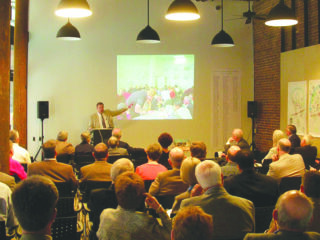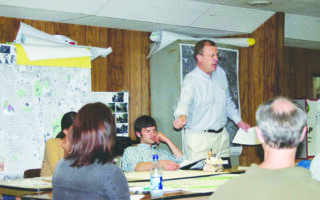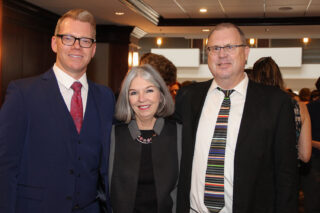September 24, 2024 TK Davis Retires After 30 Years: A Legacy of Design and Civic Engagement
Professor Thomas (TK) Davis was, it seems, born to be an architect.
As a young boy, lying in bed with the nightlight on, he’d imagine his bedroom furniture as buildings in a city.
“One of my earliest memories was sitting on the living room floor playing with blocks,” he said, adding with a chuckle, “I still have thousands of Legos.”
That passion for design led Davis to a long and influential career that’s touched hundreds of students, influenced architecture around the state, and left an impact on the field of urban design.

A reception on Thursday, October 17 at the Nashville architecture and engineering firm, Gresham Smith, will celebrate Davis’s career and the publication of his new book, The Presence Of The Absence, which chronicles 36 urban architecture design studio semesters he oversaw during his four years as design director at Nashville’s Civic Design Center and his subsequent 15 years running the Nashville Urban Design Architecture Studio, both cooperative arrangements with UT.
In the forward to Davis’s book, College of Architecture and Design Dean Jason Young wrote, “(Davis) has elevated conversations about the plight of cities, engaged civic leaders, and involved University of Tennessee students as partners in participatory civic design to develop solutions to pressing urban problems for the public good…. Perhaps Professor Davis’s influence is most deeply seen in our state’s capital. Indeed, it is hard to imagine the amazing transformation Nashville has undergone in the past 15 years without Davis’s involvement.”
A Center of Energy
After earning his bachelor’s degree in architecture at Cornell University, Davis spent a few years in “bottom rung” positions at architectural firms in Hartford, CT, and Boston. He found the work dull.
“I went back to graduate school (at Cornell) as rehabilitation,” he said. After completing his master’s degree, Davis spent a year in Italy. He was on a Fulbright scholarship to study architecture with his wife, Marleen, who he’d met during their undergraduate years at Cornell, and was directing Syracuse University’s Architecture Program in Florence.
When they returned to the states, TK also joined the faculty at Syracuse University.
The couple moved to Knoxville in 1994; Marleen was named dean of UT’s College of Architecture and Design, and TK joined the college’s faculty.
During his career in academia, TK Davis estimates he’s taught more than 800 design students and an equal number of students in architecture theory courses. He co-chaired three major conferences, including the Association of Collegiate Schools of Architecture’s 2001 regional meeting, “Modern Architecture: An Incomplete Project,” and the American Institute of Architects Tennessee’s 50th Anniversary Conference in 2003. From 1995-2003, he organized 120 lecturers, hosted a film series, and assembled numerous exhibits. He made sure news about these activities got into the hands of the most influential architecture minds in America and beyond.
“I was helping to put the school on the map as a center of energy,” he said.
Addressing Cities Issues
From 1995-2002, Davis ran the Kingsport Regional Interactive Design Studio. From 2004 to 2008, he served as design director at the Civic Design Center.
In those roles, he solicited input and helped gauge public sentiment on development plans, brought in expertise from UT faculty and Nashville leadership, and engaged students to create designs based on real community issues.
Such efforts were “totally consistent with the mission statement of a land grant institution” because it “increased the value of citizenship in our state through outreach,” he said.
The Civic Design Center is a nonprofit organization founded in 2000 by a collection of passionate Nashvillians to encourage visionary design and community engagement in urban design. Back then, UT loaned a faculty member to serve as the Design Center’s design director.
UT Professor Emeritus Mark Schimmenti was the Civic Design Center’s first design director; Davis succeeded him.
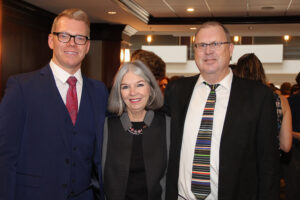
UT Architecture alumnus Gary Gaston, now chief executive officer of the Civic Design Center and host of the Oct. 17 reception, said Davis started his role with the mission of promoting “The Plan of Nashville,” a community-based vision for the city’s urban design going into the 21st century.
During his time at the Civic Design Center, Davis co-hosted a 12-episode public access television series on civic design and spoke about urban design issues at more than 120 events.
“TK brought really competent, respected leadership,” Gaston said. “He not only influenced emerging architects to understand civic design principles but to become stewards of those principles in their careers.”
Davis said he’s especially proud to have helped provide data and input that enabled Nashville leaders to adopt the Civic Design Center’s recommendation to build the 2.1 million-square-foot Music City Convention Center in its current location—close to hotels, restaurants, public transport, and in a spot where the enormous, beautiful building would encourage ongoing development.
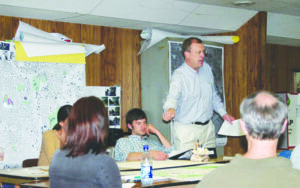
“TK used the city as a laboratory for his design students, which proved to be hugely beneficial to Nashville and Middle Tennessee,” Gaston said.
Honors Abound
During his time running the design studio in the Tri-Cities, Davis was awarded the “Keys to the City of Bristol.”
In 2008, he received a fellowship in the American Institute of Architects, one of the highest honors the AIA can bestow upon a member, for being “a leading advocate for enlightened civic and urban design.”
In 2012, he received a Collaborative Practice Award from the Association of Collegiate Schools of Architecture. The project, “Collaborations in Transit-Oriented Development,” was praised for “nurturing the teamwork of students from various backgrounds and community members to address significant urban design challenges.”
In 2013, he won a C. Peter McGrath University Community Outreach Exemplary Program Award—one of six given nationally—for a project entitled “A Participatory Outreach Partnership in Greater Nashville.”
And in 2016, TK and Marleen shared the Samuel Morgan Lifetime Service Award for Contributions to Architecture in the Public Realm, one of the two highest honors that AIA Tennessee confers. The award honors architects and individuals who have exhibited a lasting influence on the theory and practice of architecture.



